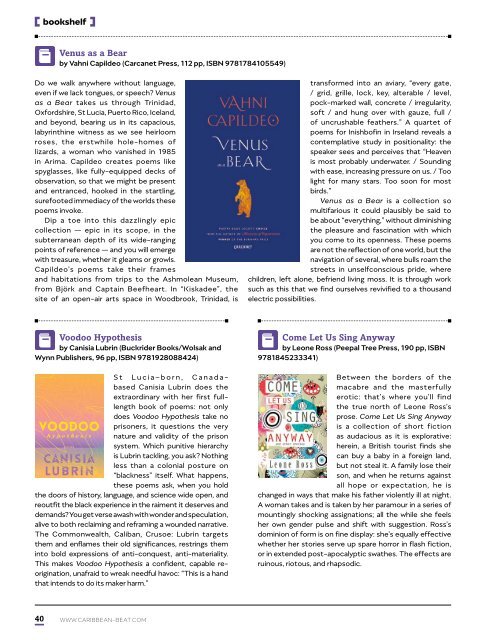Caribbean Beat — November/December 2018 (#154)
A calendar of events; music, film, and book reviews; travel features; people profiles, and much more.
A calendar of events; music, film, and book reviews; travel features; people profiles, and much more.
Create successful ePaper yourself
Turn your PDF publications into a flip-book with our unique Google optimized e-Paper software.
ookshelf<br />
Venus as a Bear<br />
by Vahni Capildeo (Carcanet Press, 112 pp, ISBN 9781784105549)<br />
Do we walk anywhere without language,<br />
even if we lack tongues, or speech? Venus<br />
as a Bear takes us through Trinidad,<br />
Oxfordshire, St Lucia, Puerto Rico, Iceland,<br />
and beyond, bearing us in its capacious,<br />
labyrinthine witness as we see heirloom<br />
roses, the erstwhile hole-homes of<br />
lizards, a woman who vanished in 1985<br />
in Arima. Capildeo creates poems like<br />
spyglasses, like fully-equipped decks of<br />
observation, so that we might be present<br />
and entranced, hooked in the startling,<br />
surefooted immediacy of the worlds these<br />
poems invoke.<br />
Dip a toe into this dazzlingly epic<br />
collection <strong>—</strong> epic in its scope, in the<br />
subterranean depth of its wide-ranging<br />
points of reference <strong>—</strong> and you will emerge<br />
with treasure, whether it gleams or growls.<br />
Capildeo’s poems take their frames<br />
and habitations from trips to the Ashmolean Museum,<br />
from Björk and Captain Beefheart. In “Kiskadee”, the<br />
site of an open-air arts space in Woodbrook, Trinidad, is<br />
transformed into an aviary, “every gate,<br />
/ grid, grille, lock, key, alterable / level,<br />
pock-marked wall, concrete / irregularity,<br />
soft / and hung over with gauze, full /<br />
of uncrushable feathers.” A quartet of<br />
poems for Inishbofin in Irseland reveals a<br />
contemplative study in positionality: the<br />
speaker sees and perceives that “Heaven<br />
is most probably underwater. / Sounding<br />
with ease, increasing pressure on us. / Too<br />
light for many stars. Too soon for most<br />
birds.”<br />
Venus as a Bear is a collection so<br />
multifarious it could plausibly be said to<br />
be about “everything,” without diminishing<br />
the pleasure and fascination with which<br />
you come to its openness. These poems<br />
are not the reflection of one world, but the<br />
navigation of several, where bulls roam the<br />
streets in unselfconscious pride, where<br />
children, left alone, befriend living moss. It is through work<br />
such as this that we find ourselves revivified to a thousand<br />
electric possibilities.<br />
Voodoo Hypothesis<br />
by Canisia Lubrin (Buckrider Books/Wolsak and<br />
Wynn Publishers, 96 pp, ISBN 9781928088424)<br />
St Lucia–born, Canadabased<br />
Canisia Lubrin does the<br />
extraordinary with her first fulllength<br />
book of poems: not only<br />
does Voodoo Hypothesis take no<br />
prisoners, it questions the very<br />
nature and validity of the prison<br />
system. Which punitive hierarchy<br />
is Lubrin tackling, you ask? Nothing<br />
less than a colonial posture on<br />
“blackness” itself. What happens,<br />
these poems ask, when you hold<br />
the doors of history, language, and science wide open, and<br />
reoutfit the black experience in the raiment it deserves and<br />
demands? You get verse awash with wonder and speculation,<br />
alive to both reclaiming and reframing a wounded narrative.<br />
The Commonwealth, Caliban, Crusoe: Lubrin targets<br />
them and enflames their old significances, restrings them<br />
into bold expressions of anti-conquest, anti-materiality.<br />
This makes Voodoo Hypothesis a confident, capable reorigination,<br />
unafraid to wreak needful havoc: “This is a hand<br />
that intends to do its maker harm.”<br />
Come Let Us Sing Anyway<br />
by Leone Ross (Peepal Tree Press, 190 pp, ISBN<br />
9781845233341)<br />
Between the borders of the<br />
macabre and the masterfully<br />
erotic: that’s where you’ll find<br />
the true north of Leone Ross’s<br />
prose. Come Let Us Sing Anyway<br />
is a collection of short fiction<br />
as audacious as it is explorative:<br />
herein, a British tourist finds she<br />
can buy a baby in a foreign land,<br />
but not steal it. A family lose their<br />
son, and when he returns against<br />
all hope or expectation, he is<br />
changed in ways that make his father violently ill at night.<br />
A woman takes and is taken by her paramour in a series of<br />
mountingly shocking assignations; all the while she feels<br />
her own gender pulse and shift with suggestion. Ross’s<br />
dominion of form is on fine display: she’s equally effective<br />
whether her stories serve up spare horror in flash fiction,<br />
or in extended post-apocalyptic swathes. The effects are<br />
ruinous, riotous, and rhapsodic.<br />
40 WWW.CARIBBEAN-BEAT.COM


















